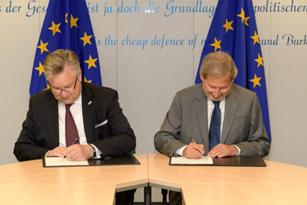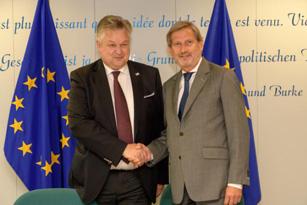
Brussels, 27 June 2017 − Today, EU Commissioner for European Neighbourhood Policy and Enlargement Negotiations Johannes Hahn and Director of OSCE Office for Democratic Institutions and Human Rights (ODIHR) Michael Georg Link signed a new project to support democratic elections in the Western Balkans.
This new three years project will be implemented by ODIHR and will support Albania, Bosnia and Herzegovina, the former Yugoslav Republic of Macedonia, Montenegro and Serbia, as well as Kosovo in their efforts to follow-up on election observation recommendations in areas related to election management, voter registration and the conduct of the media during election campaigns. The project has a total budget of €1.6 million and is co-funded by the EU (€1.4 million) and by ODIHR (€200,000 provided by the Austrian Development Agency).
Commissioner Hahn said: “The agreement signed today demonstrates our strong commitment to help the Western Balkans on their path to EU accession. With this Support for Elections in the Western Balkans, the Commission remains focused on the "fundamentals first" in the enlargement process and on the values which underpin it. Democracy and the credibility and stability of elected bodies clearly depend on free and fair electoral processes, to which ODIHR makes a key contribution".

“Within this project, our Office will intensify efforts to promote follow-up of electoral recommendations with a view to bringing elections further in line with OSCE commitments and other international obligations and standards for democratic elections,” said Director Link. “If recommendations to address shortcomings identified by election observation missions are not given serious consideration and effectively addressed, there is a real risk that vulnerabilities will persist and, in all likelihood, increase.”
All OSCE participating States have committed to follow up on ODIHR electoral assessments and recommendations, while the EU has noted the need to support the follow-up of ODIHR recommendations and to strengthen the link with the wider democratic reforms required for the Western Balkans to meet their European Integration ambitions. ODIHR has a long history of their efforts to address electoral assessments and recommendations and in 2016 published its Handbook on the Follow-up of Electoral Recommendations. Within the framework of the project, ODIHR will co-operate closely with civil society organizations and providers of electoral assistance, as well as OSCE field offices and EU Delegations.
Details
- Publication date
- 27 June 2017
- Author
- Directorate-General for Neighbourhood and Enlargement Negotiations
